

Understanding Trump « George Lakoff. Understanding Trump By George Lakoff There is a lot being written and spoken about Trump by intelligent and articulate commentators whose insights I respect.
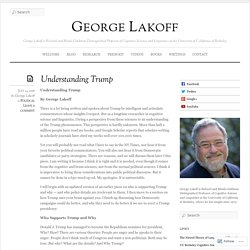
But as a longtime researcher in cognitive science and linguistics, I bring a perspective from these sciences to an understanding of the Trump phenomenon. This perspective is hardly unknown. More than half a million people have read my books, and Google Scholar reports that scholars writing in scholarly journals have cited my works well over 100,000 times. Yet you will probably not read what I have to say in the NY Times, nor hear it from your favorite political commentators. I will begin with an updated version of an earlier piece on who is supporting Trump and why — and why policy details are irrelevant to them. Who Supports Trump and Why Donald J. Theconversation. What we know affects our visual perception of the world, study finds. It’s no secret that people’s eyes see the world in slightly different ways, but those differences aren’t just limited to disparities in how our brains process colour and light.
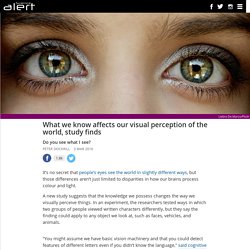
A new study suggests that the knowledge we possess changes the way we visually perceive things. In an experiment, the researchers tested ways in which two groups of people viewed written characters differently, but they say the finding could apply to any object we look at, such as faces, vehicles, and animals. "You might assume we have basic vision machinery and that you could detect features of different letters even if you didn’t know the language," said cognitive scientist Brenda Rapp from Johns Hopkins University. Google Image Result for. How to Work Through Difficulty: Lewis Carroll’s Three Tips for Overcoming Creative Block. In addition to having authored my all-time favorite book, Alice in Wonderland, Lewis Carroll was a man of extraordinary and frequently prescient wisdom on matters of everyday life — his nine commandments of letter-writing offer timely insight into how we can make modern digital communication more civil, and his four rules for digesting information are a saving grace for our age of information overload.
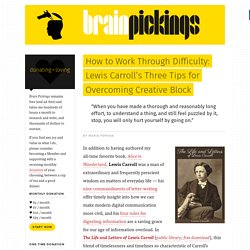
In The Life and Letters of Lewis Carroll (public library; free download), this blend of timelessness and timelines so characteristic of Carroll’s thinking comes vibrantly ablaze, but nowhere more so than in an 1885 letter to one of his child-friends, a young lady named Edith Rix. Carroll addresses the age-old question of how to overcome creative block. Carroll offers young Edith three tips: When you have made a thorough and reasonably long effort, to understand a thing, and still feel puzzled by it, stop, you will only hurt yourself by going on.
The Hidden Brain: How Ocean Currents Explain Our Unconscious Social Biases. Biases often work in surreptitious ways — they sneak in through the backdoor of our conscience, our good-personhood, and our highest rational convictions, and lodge themselves between us and the world, between our imperfect humanity and our aspirational selves, between who we believe we are and how we behave.
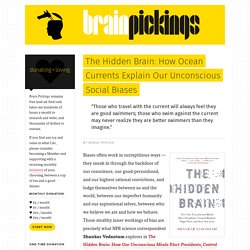
Those stealthy inner workings of bias are precisely what NPR science correspondent Shankar Vedantam explores in The Hidden Brain: How Our Unconscious Minds Elect Presidents, Control Markets, Wage Wars, and Save Our Lives (public library) — a sweeping, eye-opening, uncomfortable yet necessary account of how our imperceptible prejudices sneak past our conscious selves and produce “subtle cognitive errors that lay beneath the rim of awareness,” making our actions stand at odds with our intentions and resulting in everything from financial errors based on misjudging risk to voter manipulation to protracted conflicts between people, nations, and groups. Researchers Observe Effects of Art on the Brain.
Pure Science Specials - Automatic Brain: The Magic of the Unconscious Mind. Tom Wujec: 3 ways the brain creates meaning. Daniel Tammet: Different ways of knowing. The Neuroscience of How We Make Decisions, Summed Up in 30 Seconds. 7 talks on how we make choices. Dan Gilbert: Why we make bad decisions. Why We Ignore the Obvious: The Psychology of Willful Blindness. By Maria Popova How to counter the gradual narrowing of our horizons.
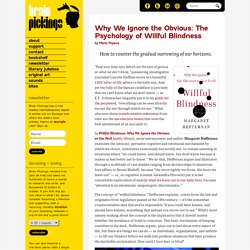
“Keep your baby eyes (which are the eyes of genius) on what we don’t know,” pioneering investigative journalist Lincoln Steffens wrote in a beautiful 1926 letter of life-advice to his baby son. And yet the folly of the human condition is precisely that we can’t know what we don’t know — as E.F. Schumacher elegantly put it in his guide for the perplexed, “everything can be seen directly except the eye through which we see.” What obscures those transformative unknowns from view are the unconscious biases that even the best-intentioned of us succumb to. The concept of “willful blindness,” Heffernan explains, comes from the law and originates from legislature passed in the 19th century — it’s the somewhat counterintuitive idea that you’re responsible “if you could have known, and should have known, something that instead you strove not to see.”
Ruth Chang: How to make hard choices. Daniel Reisel: The neuroscience of restorative justice. Neurogenesis, leadership and rewiring your own brain - Ockham's Razor. When it comes to the brain, ‘use it or lose it’ should be the mantra.
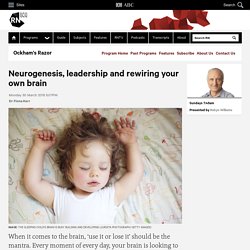
Every moment of every day, your brain is looking to prune old neurons to make way for new pathways in response to new stimuli. Trying Not to Try: How to Cultivate the Paradoxical Art of Spontaneity Through the Chinese Concept of Wu-Wei. By Maria Popova “Our modern conception of human excellence is too often impoverished, cold, and bloodless.
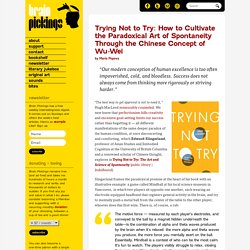
Success does not always come from thinking more rigorously or striving harder.” Alison Gopnik: What do babies think? A Developmental Tour of the Imagination: What Children's Use of Metaphor Reveals about the Mind. By Maria Popova “Metaphorical thinking … is essential to how we communicate, learn, discover, and invent.” “Children help us to mediate between the ideal and the real,” MoMA’s Juliet Kinchin wrote in her fascinating design history of childhood . What a Plant Knows. By Maria Popova How a plant can tell whether you’re wearing a blue or red shirt as you’re approaching it.

As I was planting my seasonal crop of tomatoes last month, a good friend (and my personal gardening guru) informed me that they liked their leaves rubbed, “like petting a pet’s ears,” which I received with equal parts astonishment, amusement, and mild concern for my friend. Glogin?mobile=1&URI= The Germ Theory of Democracy, Dictatorship, and Your Cherished Beliefs. One morning last fall, the evolutionary biologist Randy Thornhill was standing with me in front of the gorilla enclosure at the Albuquerque zoo.
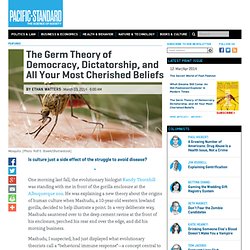
He was explaining a new theory about the origins of human culture when Mashudu, a 10-year-old western lowland gorilla, decided to help illustrate a point. In a very deliberate way, Mashudu sauntered over to the deep cement ravine at the front of his enclosure, perched his rear end over the edge, and did his morning business. Mashudu, I suspected, had just displayed what evolutionary theorists call a “behavioral immune response”—a concept central to Thornhill’s big theory. So I asked him whether I was right about Mashudu. “Pooping downhill is pretty smart,” Thornhill said after some consideration. It might seem strange to fixate on how a gorilla goes about answering the call of nature. What kind of government do you live under? The threat of disease is not uniform around the world. The Science of Your Racist Brain.
Neuroscientist David Amodio on subconscious racial prejudice and why we're still responsible for our actions.
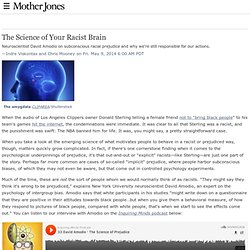
—Indre Viskontas and Chris Mooney on Fri. May 9, 2014 6:00 AM PDT When the audio of Los Angeles Clippers owner Donald Sterling telling a female friend not to "bring black people" to his team's games hit the internet, the condemnations were immediate. Your brain helps you judge a face before you even see it. Why are we getting smarter? Further reading on the “Flynn effect” James Flynn points out a fascinating dynamic at TED2013, that we appear to be getting smarter. Photo: James Duncan Davidson In the 1980s, psychologist James Flynn discovered that, over the past century, our average IQ has increased dramatically.